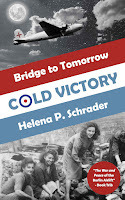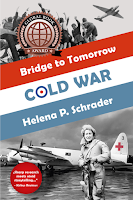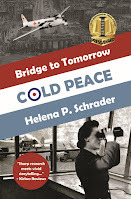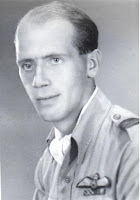Characters of "Cold Victory" : DAVID GOLDMAN
David Goldman, a German-Jew with a Canadian passport and a wartime record with the RAF, has invested the fortune inherited from his father in the establishment of an aviation company. His firm is not only flying freight into Berlin as part of the Berlin Airlift, it is also flying patients out in an air ambulance. But while the business is doing well, David's private life is a shambles after the German woman he fell in love with, Charlotte Walmsdorf, rejects him to marry her returned fiancee.
During the war, David was badly burned while flying a Hurricane in combat, and his face was 'reconstructed' by the famous plastic surgeon Dr McIndoe -- just as was the face of the young man in the portrait above, Wing Commander Bob Doe.
This excerpt from the start of "Cold Victory" depicts his state of mind at this low point in his life.
Sammy lickedDavid’s face to wake him. As the dog’s rough tongue brought him back toconsciousness, he groaned. His shoulder was killing him from lying on it fortoo long on the floor. He dragged himself upright and looked around. He was ina small, old-fashioned sitting room with an empty wine bottle beside him and adirty wineglass on the table. Where was he and what day was it?
Gradually thingsstarted to come back to him. After the police had failed to arrest the manliving in his uncle’s gracious house on the Havel, he’d been slipped the keyswith the hint that no one would object to him re-occupying family propertywhile his restitution claim worked its way through the bureaucracy. He’dcollected Sammy from the Priestman’s home in Kladow, taken all his personalbelongings out of the apartment over the company office on Kurfuerstendamm, andmoved into the house here on the Schwanenwerder. The main house with its highceilings and large windows, however, was freezing and lonely. So, he’dset himself up in the housekeeper’s old apartment at the back of the houseinstead. It was small, cosy and could be heated more easily. In addition, thewindows were nearly overgrown with vines, making it harder for people to lookin. He could also come and go by the back door, avoiding the main entrance thatthe police had boarded up.
David had madehimself quite comfortable, but then the nightmares started. He dreamt of hischildhood, fleeing his father’s contempt and the ridicule of the otherchildren. He heard again his parents’ whispers about bankruptcies, dismissals,terminated contracts and suicides. The memories merged with films ofconcentration camps and photos of mass graves in the forests east of Warsaw.They mutated into his own melted face, the patchwork of skin, the stitches andswelling, the smell of pus and disinfectant.
“Oh, Sammy,”David gasped out and pulled the blond collie mix into his arms. He’d adoptedSammy when his face was at an early stage of reconstruction. The dog haddiligently licked his regenerating skin night after night in an obsessivedetermination to help his new master recover.
Sammy was skinny,he noted with shock, and sat up more completely. How long had he been lyinghere? Why on the floor rather than the bed? When was the last time he’d fedSammy? There was a dog door, and Sammy could get out to drink from the lake,but unless he’d managed to catch a bird or a rabbit for himself, David didn’tthink he’d been fed in several days.
David draggedhimself to his feet. He was wearing four layers of jumpers, corduroy trousers,thick socks and fleece slippers. His head ached, his mouth tasted foul, and hisstomach rumbled. He hadn’t fed himself either. He made his way to the lavatory,relieved himself, and then went into the staff kitchen. He opened cupboardsrandomly until he found some cans of spam and emptied the contents into Sammy’sbowl. While the dog ate ravenously, he returned to the bathroom to strip downand wash himself, brush his teeth and change into clean clothes.
When he wasdressed again, he returned to the kitchen, gave Sammy a second can of spam, andcut the contents of a third can into slices that he laid on slabs of stalebread. It was dry and unappetizing but temporarily filling. He washed it downwith tap water, left the plate and glass in the sink with a stack of otherdirty dishes, and sank onto the chair to stare out of the window.
There was nothingto see but fog and desultory moisture dripping from the eaves. Then he noticeda sparrow clinging to a dead vine. A microcosm of his life perhaps? Sammyleaned against his leg and whimpered, begging for his attention, so he bent toscratch him behind his ears and massage the back of his neck, murmuringapologies. “Sorry, old boy. I didn’t mean to neglect you. I promise to improve.I should not have come here. It was a colossal mistake. I should have left theghosts alone. I don’t need anything here. It’s a ball and chain around my ankleholding me back, stopping me from flying. We ought to be flying, Sammy. Abovethe clouds. Soaring again.” The thought of a Spitfire on the wing brought thefaintest of smiles to his lips, and Sammy reached out with his tongue toexpress approval.
“At least thatNazi bastard is gone. I can turn the house over to the city and let themrelocate homeless people here. Whatever.” He shrugged as he registeredthat most of those homeless people would also have shouted “Heil Hitler,”rejected their Jewish neighbours, thought of themselves as ‘supermen’ andgloried in the conquest of half of Europe. But he couldn’t find the energy tobe outraged any more. He just wanted to get away. To leave Berlin and Germanybehind and start his life over again.
He had a Canadianpassport, after all. His mother, one sister and his brother were still there.He could go to the New World and start over again.
But he didn’tmove. He just stared out of the window and watched the moisture on the tip of anaked vine fatten until it was heavy enough to fall with a soft ‘platsch’ ontothe windowsill. He also heard faint laughter echoing in the rooms overhead. Hiscousins were giggling as they played some silly game. His uncle called out thathe was home, and his aunt urged, “Come girls, your father’s home.”
“It’s so peacefulhere,” Charlotte said timidly in his brain. “It’s as if there never was a war. Are those lilacs? They must be glorious when they bloom. And look! Isthat a peacock? Do you think it escaped from the Pfaueninsel?” Charlotte wasalways so timid and hesitant in his presence. “Is that a stable? Oh, David,could we have horses? I would so love to have horses in my life again.”
David put hishands to his face. Desperate to explain why Charlotte had left him, he’dsearched his memory a million times for some trace of disdain, contempt,superiority, arrogance, or a hint of antisemitism. Instead, all he heard wasCharlotte’s shy, breathy voice as she expressed her thanks for every littlething he did for her. His memories revealed only uncertainty when she talked ofbusiness matters and diffidence towards every decision he made. He was hauntedby the rare tinkling of her laughter and her smiles like rays of sunshinepiercing the fog. How could Charlotte, of all people, reject him?
Christian hadsaid it was because of the rapes, but David’s brain refused to go there. Hesimply could not cope with the thought of Charlotte being ravaged — much lesssix times. He did not believe it. Christian had been trying to manipulate himinto forgiving her. Or maybe Christian believed it. But David didn’t. Charlottecould not have survived being gang raped. She was too fragile. An experiencelike that would have destroyed her. She would have gone mad or killed herself.Ergo it could not have happened at all, and that meant she had some otherreason for rejecting him. There had to be something about him that she couldnot accept....
Find out more about the Bridge to Tomorrow series, the awards it has won, and read reviews at: https://helenapschrader.net/bridge-to-tomorrow/







